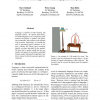Free Online Productivity Tools
i2Speak
i2Symbol
i2OCR
iTex2Img
iWeb2Print
iWeb2Shot
i2Type
iPdf2Split
iPdf2Merge
i2Bopomofo
i2Arabic
i2Style
i2Image
i2PDF
iLatex2Rtf
Sci2ools
89
Voted
EMNLP
2010
2010
A Game-Theoretic Approach to Generating Spatial Descriptions
Language is sensitive to both semantic and pragmatic effects. To capture both effects, we model language use as a cooperative game between two players: a speaker, who generates an utterance, and a listener, who responds with an action. Specifically, we consider the task of generating spatial references to objects, wherein the listener must accurately identify an object described by the speaker. We show that a speaker model that acts optimally with respect to an explicit, embedded listener model substantially outperforms one that is trained to directly generate spatial descriptions.
Related Content
| Added | 11 Feb 2011 |
| Updated | 11 Feb 2011 |
| Type | Journal |
| Year | 2010 |
| Where | EMNLP |
| Authors | Dave Golland, Percy Liang, Dan Klein |
Comments (0)

